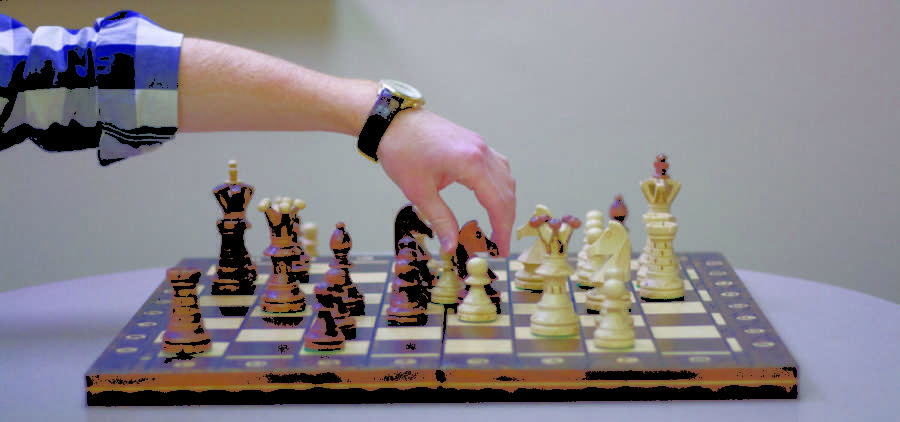Peterson: Life is not a game with an opponent
Photo: Kelsey Kremer/Iowa State Daily
Chess is an ageless metaphor for the complexities of real life.
November 15, 2011
I love the game of chess. The parameters are fixed, the rules are set, and the play is grounded by 64 squares. You can see it all set right before you; there’s no imponderabilia, no surprises, there is only checkmate. The total number of games is almost unpredictable, but it always ends the same: checkmate. You win and you lose, but you always know the moves that got you there.
Chess serves as a calm and quite tranquility against the uncontrollable complexity of life. Chess is clean where life is messy. Life is unpredictable and unbound by any dimensions. We act simultaneously; the most distant actions drastically affecting one another. Between the least significant actors across the greatest distances there is some level of connection which we cannot ignore if we wish to master life.
In chess there are two players with one connection between them, but life is “played” with millions at a time. We hold endless connections through technology and our daily confrontation. Chess is played against one and either we win or lose; life forces us to work with countless opponents in pursuit of ever-changing goals. Checkmate looks relatively simple compared to the complications and interconnections of a single week.
Chess has a single goal held constant through the game. In life you don’t have one goal and your aspirations are anything but constant. Our goals and conceptions change constantly, when we fail they may shrink and after accomplishment they grow. Mastery of the game and general contentment are your only avenues for overall success, and you’ll always need teams to help you achieve it.
In life there are teams which provide support and share common concerns. Teams are never fixed but exist in constant flux of size and composition. Your opponents today on this issue will be your allies tomorrow on another. Some issues generate massive publics, while others remain relatively small. The individual you despise in your Tuesday and Thursday class might be the individual you’re paired with for a project. You might find that you share larger concerns than you think.
President Teddy Roosevelt was a champion of the game, saying that “the most important single ingredient in the formula of success is knowing how to get along with people.” They help you get that job, study for a class, and get through hard times, but only as long as they hold respect for you.
Engineers I know have learned this lesson well in regards to networking, and as a runner I’ve found that no great man or woman ever did anything without the great support of others. In this game you can’t afford to play alone and you can’t bear to isolate allies. Even in your day to day activities it helps to have the support of friends, family and professors. Work with people, and they’ll help you when you need them.
Chess is a zero-sum game, you can’t work together. Your gain is directly proportionate to your opponent’s loss. In life there are immediate and detrimental consequences for this view. You may innately dislike individuals, but you don’t have enemies per se. Conquest may seem like the best strategy, but it’s far better to convert an individual than to destroy them.
Life is threatening enough; daily work, class, and drama alone can exhaust you. Not to mention infamous events of trauma, accidents, and abuse which can be devastating. You don’t need to exhaust yourselves further by rambling against your potential allies.
Life doesn’t have sixteen individual pieces set aside to help you. By your actions millions may be willing to help you, but just as likely you may be left completely alone when challenges arise. You can’t predict the varying strengths of individuals as easily as the kings, bishops, and rooks of chess. You must learn people by playing with them. Don’t underestimate them: move, adapt, and play the game alongside them.
People can retreat, advance, sacrifice, and deploy any method, rational or irrational, as they see fit. As you play you’ll learn how individuals operate. This is a game that we can continue forever, pass it to our kids, change the rules, and forever learn from. Unlike the pieces on a board there is no determined way we must precede. We can act, think, deceive, and create endless possibilities as opposed to chess’ permanent and predetermined patterns.
Every day you have new chances to play and innovate; life is never done. There is no checkmate. As pieces are removed from the board others come on. You graduate from college: now what? You got a job: now what? What is the measure for success and completion in life? Through the best and worst of conditions life continues. We’re forced to encounter cancer, bankruptcy, death, and uncertainty, but everyday life continues. Gain leads to loss, we love and we lose, we win then we inevitably face a defeat. Time keeps going if we want it to or not.
It’s critical to get into action and seize the moment; the time clock is ticking. You can wait without making a move while life continues or you can take the field. You can try to isolate yourself, but life will automatically pull you in. We cannot avoid life, unlike chess it’s a game you have to play. We spend endless hours playing other games but we neglect the greatest “game” of them all, our own life.

















